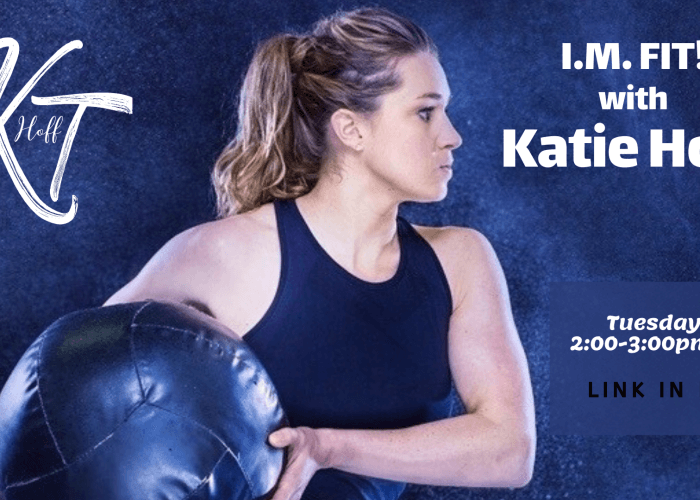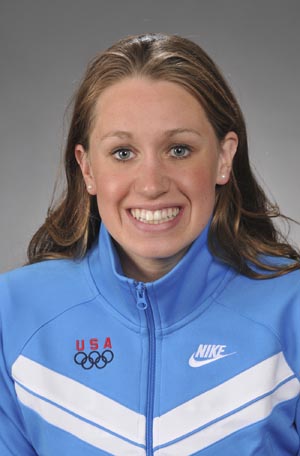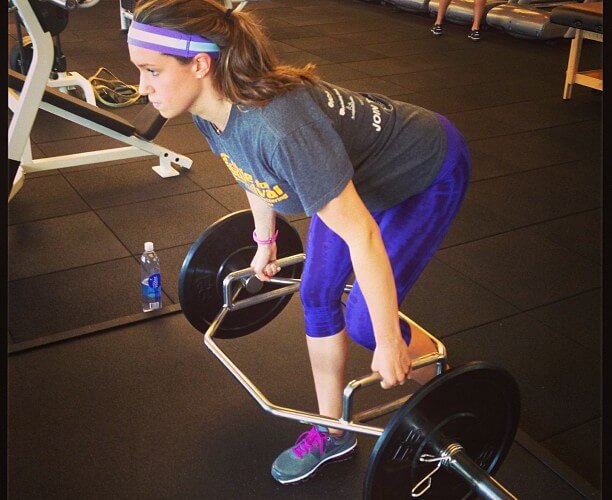Champion’s Mojo: Digging Deep with Olympian Katie Hoff

Katie Hoff (Champion’s Mojo Podcast)
Katie Hoff changed swimming endorsements, signing a 10-year sponsorship deal with Speedo, the longest deal ever signed at the time, and forfeited her NCAA eligibility in 2006. She is a former world and American-record holder, and won three Olympic medals, including a silver in 2008 in the 400 freestyle. Following a brief hiatus from the sport, she made a return, attempting to qualify for the 2016 Olympic Games, only to suffer from blood clots in her lungs that ended her chances at making the team. Hear her thoughts on her career and how she persevered through adversity by finding that “other gear” deep down.
Below is an abridged version of the interview, conducted by Kelly Palace and Maria Parker, with Katie Hoff. You can listen to the full podcast episode #65 at https://championsmojo.com or by clicking here.
Champion’s Mojo: So what have you been up to lately?
Katie Hoff: Lately I’ve been in the thick of quarantine with everybody else out there. My husband and I recently drove eight hours from where we currently live in New Jersey, to Michigan to quarantine with my in-laws. Sometimes I feel like in-laws is something of a bad word, but I get along really well with them. We’re very fortunate to be able to be with family during this time. I’ve been doing some fun webinars, providing some dryland exercises for swimmers which has been really fun. And I’ve been working on finishing up my book. So I’ve really been taking advantage of this time.
Champion’s Mojo: Tell us about your book.
Katie Hoff: My book has kind of been in the works for a number of years, but I never really felt like I had the ability to really confront and face my past and work with someone that I really trusted. I worked with a ghostwriter to get out all of my feelings, all of my thoughts, and really construct a very inspiring, motivating story. We’ve been working on that for the past six months now and it’s at completion right now. I’m now taking the next step to publishing and really looking forward to getting my story out there. It’s been very therapeutic. I think it’s been way more rewarding than I could have ever expected.
Champion’s Mojo: Since you’ve retired, what are your thoughts looking back? What is it like having held an American record, a world record, but never having won Olympic gold?

Katie Hoff – Photo Courtesy: CGSports
Katie Hoff: A lot of the process of my book has been understanding and coming to terms with framing that particular thing. The one thing that I wasn’t able to achieve is a gold medal. You’re never able to put that into words. I think what I concluded is that you’re never going to fully come to terms with something like that. You trained for years. You put everything on the line. You put your heart, soul, blood, sweat, tears into this goal, and when that slips away from you, it’s never going to feel good. I really did take a full step away from the swimming world and community to kind of find myself away from that. I spent about five years off of the swimming grid. Now that I’ve done that and kind of circled back. Reaching out to friends, teammates, being more involved in clinics. I’ve really arrived at the fact that it’s not always about that I didn’t reach my goal, but looking at how that shaped me and to look at the skill sets that gave me. Looking at the experiences I was able to go through because of that journey. That’s where I’ve arrived and the ending of the book does such a great job of wrapping that up. I don’t want to give away too much but that, in essence is, where I’ve really found peace.
Champion’s Mojo: So you’re grateful for everything and what you learned from it?
Katie Hoff: I think grateful is a perfect word for it. I think the biggest thing for me in that process was to get to grateful because I think there was a lot of resentment on my part from the way that I had to leave the sport and just feeling like I didn’t have this perfect ending. Not being able to have that go as planned was really difficult. I wasn’t able to be grateful for five years. There was just always this nagging feeling in my life that my husband, who was an elite athlete himself, was always noticing. He kind of had to watch me go through this process of mourning that I think anyone has when they pour everything into something and it doesn’t necessarily go the way that they had intended it. I’m just so happy that I was able to get there. I think sometimes people go their whole lives and they just kind of push it under the rug or just never address it again. It manifests itself in different, negative ways. I feel so much better. It’s still a work in progress. I’m certainly not saying that I’m perfect and just feeling amazing every single day, but being able to now feel more grateful and have a better appreciation for my career has allowed me to write a book and has allowed me to want to be on podcasts and speak about it and give speeches and give a TED talk and and all these wonderful things that I would have never been able to do
Champion’s Mojo: Can you tell us a little bit about your career?
Katie Hoff: I think that’s what made having to end in this way that much more painful because I really was on that path. I was making a comeback in 2013. The whole point of that comeback was to really enjoy the process. Prior to that, I had not been enjoying the process. I had lost my passion a little bit, which is what prompted me taking the year off. For the first time in a really long time, I was enjoying going to practice. I had an awesome partnership with my coach. My husband was training me on land. I felt so explosive and strong heading into the 2014 National Championships in Irvine, California, which is really the setup for everything leading up to Olympic Trials and to Rio. For those listeners who don’t know much about swimming, you qualify not only for the Pan Pacific Championships, but you qualify for the World Championship at that meet. It really sets up your next two years of swimming internationally for Team USA into the Olympics. I remember just feeling so ecstatic, so relieved, that I was kind of finding my pace again and finding my joy. I landed and I remember feeling this just weirdness in my chest. I guess that’s the best way to describe it. Like when you have a cold coming on or some type of sickness. Just a little funny and feeling a little bit more shortness of breath than normal. As any athlete in that situation would do, I kind of brushed it off and thought, it’s fine. I don’t have time to get sick right now. It’s just a cold, nothing to worry about. Fast forward a couple of days and it quickly moved into a sharp pain in my rib area. I swam the prelims of the 100 freestyle as kind of a tuneup. I ended up getting out of the pool after not swimming great, feeling like someone was stabbing me with a sword in my ribs. Unfortunately I had to pull out of the meet. At that point I was getting all these different diagnoses. The initial one was an intercostal strain. I remember thinking, huh? A strain? How weak are you that you can’t push through a strain? I flew back to Miami, where I was living at the time, and began probably the most confusing six weeks of my life. I was going to different doctors. They were telling me that I had pneumonia. They put me on a Z-pack. They’re telling me I had asthma. Here I am feeling crazy and weak and scared. The pain had gotten so intense in my rib area that I passed out. Thank goodness the bed was there. I finally demanded a blood test that showed an indication of a blood clot. I got a CAT scan and immediately was admitted to the hospital because I had two blood clots in my right lung. I was definitely worried. For the past six weeks I had felt like I had started to question myself. Like, what’s wrong with me? Why am I having this extreme pain but no one can find out what’s wrong with me? I found out later 100,000 Americans die every year from a pulmonary embolism. It happens all the time. I wasn’t thinking about death. I was thinking about if the blood thinners they were gonna put me on were going to affect my endurance? Still in the mindset of an athlete and wanting to swim fast and not thinking about my life. I kept trying to swim. I kept trying to make it work. What I was told by a surgeon and doctor was that the scar tissue that builds up in my lungs during that period where the blood clots were would make it very challenging to swim at a top level for Trials. I had to ultimately make the decision to retire. The whole point of coming back was to enjoy the process and I was miserable. Each and every day I was crying. I couldn’t breathe. It just wasn’t worth it to me to end my career at Trials. It’s miserable, not being the best version of myself for my teammates, my family, my husband. That’s when I retired in December of 2015.
Champion’s Mojo: Can you tell us a bit about the work you’ve done with this condition since then?
Katie Hoff: I was able for a year to go around to different doctors’ conventions, different speaking summits, to raise awareness for pulmonary embolism, DVT, to really help doctors understand that it doesn’t just happen to older people. There’s so many younger people that have the condition. There’s so many, I guess you could say, healthy looking people that experience this. I felt like that was the biggest struggle for me when I was going through the diagnosis process. A doctor would walk in and say, well, you look healthy. What does that mean? It meant so much to be able to give back. To help raise awareness. Feeling like I was actually able to put power behind something traumatic that had happened to me. I think that’s also where I caught the public speaking bug a little bit too. I had always done clinics and done speaking engagements for Speedo or different sponsors. This was the first time that I had really spoken in front of a group or demographic that wasn’t just swimmers. They were highly respected doctors. I felt such a charge and sense of pride to be able to speak in front of a group like that.
Champion’s Mojo: Can you break down what someone should look for with this condition?
Katie Hoff: Plane rides can definitely be a cause of it. Birth control is definitely another possible cause. An intense, traumatic injury. Those are some big indicators. Lower heart rate. Dehydration. These are all things you can have running your family. They ruled out pretty much everything other than potentially the dehydration. I was living in Miami where it’s obviously hot. I have a lower heart rate as an athlete. I tested for everything under the sun. The biggest thing that happens is you feel something, a pain in your chest most of the time. Sometimes in your leg. Being an athlete, you’re sore all the time. So I think that’s the hardest thing to catch when you are just used to that feeling. There’s two different types. There’s DVT and then there’s a pulmonary embolism. I had the pulmonary embolism. Once you have that, it can travel. For me it traveled to my lungs. Thank goodness for the fact that I’m still breathing today. It didn’t travel to my brain because that’s essentially deadly. I think the sooner that you can get on blood thinners and go see a doctor, the better. It’s interesting because part of the campaign I was involved in I was able to go and talk with other athletes who experienced it. One of them was Brian Vickers, who was a NASCAR driver. He had DVT. He talked about very similar reactions, just not thinking about it. Not really realizing what it was. I think that’s the biggest issue, people don’t go to their doctor right away.
Champion’s Mojo: In your TED talk you talk about finding that deep down, that other gear, can you talk about that?
Katie Hoff: That’s definitely in my book because it’s such a pivotal moment in my life and my career of just finding that, wow, I can kick a little harder, I can pull a little harder. It’s more painful and it sucks, but it’s getting me to where I need to be. So it’s worth it. I think the message in my TE D talk is that sometimes you have to use that deep down, that way of pushing through things. When I finished my swimming career, I didn’t know what my passion was anymore. It’s taken me five years of just continuously having to dig and try new things and be relentless in the face of not knowing what I was needing that deep down for. I think that’s the hardest thing and that’s the message I would want to give to people. If I’d done my TED talk over again I would talk about how, maybe you don’t have something that requires you to go to that deep down, but that’s all the more reason to keep pressing forward to find it. Maybe you don’t have a why. Maybe you don’t have a need that allows you to go deep down, but that’s all the more reason that you have to keep pressing forward to find that. It takes a lot of patience and it takes a lot of resilience because it can take a really long time. For me it took five years. I think in order to get deep down, it’s just having that push, that ability, to get back up because it’s out there, and you have to believe and trust that it’s out there.
D talk is that sometimes you have to use that deep down, that way of pushing through things. When I finished my swimming career, I didn’t know what my passion was anymore. It’s taken me five years of just continuously having to dig and try new things and be relentless in the face of not knowing what I was needing that deep down for. I think that’s the hardest thing and that’s the message I would want to give to people. If I’d done my TED talk over again I would talk about how, maybe you don’t have something that requires you to go to that deep down, but that’s all the more reason to keep pressing forward to find it. Maybe you don’t have a why. Maybe you don’t have a need that allows you to go deep down, but that’s all the more reason that you have to keep pressing forward to find that. It takes a lot of patience and it takes a lot of resilience because it can take a really long time. For me it took five years. I think in order to get deep down, it’s just having that push, that ability, to get back up because it’s out there, and you have to believe and trust that it’s out there.
Champion’s Mojo: How can a normal person learn to find that deep down, that extra gear?
Katie Hoff: I think it’s funny because that TED talk is what really helps me develop that perspective and that message. So my new speech is called Embrace the Suck. It’s military slang, but it’s really just about embracing the fact that anything worth accomplishing that’s big enough is going to be painful physically, mentally, emotionally in its process. Even sometimes when you know for a fact that you’re ready to accomplish something, life could still throw a curveball that’s painful and sucks too. I think the underlying push for anyone is defining that need or want. The piece of it that I’ve kind of developed over the past year is that, even if you say you’re in a job that you just hate, which is unfortunately a lot of people, there has to be that mentality that, ok, this is going to lead me to my dream job, and then making a pivot in your life needs to happen because you can really only embrace the pain. Embrace the suck if it’s worth it in your mind. If it’s big enough. if it scares you a little bit. If you don’t have that, it’s gonna be really, really difficult to find your deep down and your extra gear. I think not everyone is fortunate enough. I was really fortunate enough early in my life to find that in swimming, but I actually had to go through it again when I didn’t have swimming and I had to start over. I had to understand, ok, what’s going to allow me to elicit that deep down again? It took me until now really to feel like I was able to find it again. So you might have to try out and embrace a couple of ways before you get to another good.
Champion’s Mojo: What advice would you give to people who’ve had things that come up unexpectedly, like the NCAA swimmers who lost part of the end of their season?
Katie Hoff: It’s broken my heart to have to watch that everywhere. I mean, even in high school or graduating from high school, missing their prom. It’s happening on every level. I think the only advice that feels very genuine and authentic is controlling what you can control. I think for the swimmers that are going to continue on and look to 2021 to try out for the Olympic team, it’s doing everything possible on land right now to stay strong. Working on visualization. Working on meditation. All the things that you can control without getting in a pool or without getting on a track or whatever facility you use in your sport. That’s really all I could do. When I had the blood clot, it was just about trying to keep forging on. Keep controlling what I can control. Some days I may break down and cry and I just need to let that happen. But just keep putting one foot in front of the other and continue to evaluate and analyze. Is this goal in front of me still what I want? If yes, then keep putting one foot in front of the other and finding things that make you feel empowered and make you feel in control of what’s in front of you. Even in a world where there are so many things that you could count that are out of your control.
Champion’s Mojo: How much of your process was mourning?

Photo Courtesy: Todd Anderson
Katie Hoff: A lot. I think that’s the biggest message when I talk to people. I think sometimes we all want to be so positive and we want to say not to think about it, just move on. Just put on a happy face, fake it till you make it. I actually feel differently. I think it’s so important to have a meltdown, to cry, to acknowledge that it is awful. By keeping that bottled in and just pushing it under the rug, I think it makes it ten times harder to put one foot in front of the other. I actually always use this analogy. It has to do with the 400 IM. There’s this moment in the ready room where you have a couple of swimmers that are kind of trying to do that. They’re smiling, saying this is great. I’m excited to swim. Then you have what I would do and what my teammates and I would do, just saying, wow, this is going to be so painful. This is going to suck. There’s no way around it. It was just so painful. But the reason we do it is because, in my opinion, it’s the race that I felt the most satisfaction, the most fulfillment when I would break a record or go a best time. So it’s worth it. It takes more energy to pretend than just acknowledging it and then moving forward. And that’s how I pretty much have tried to approach everything in my life thus far. Just acknowledging that doesn’t mean you’re being negative. It just means you’re acknowledging some negativity and then letting it go and then moving forward.
Champion’s Mojo: You’ve said you have a need to be extraordinary, tell us what that means and how you live that.
Katie Hoff: I think being extraordinary to me is my ultimate driver and need. It’s funny because when I first started swimming and when I entered my career, I always thought, well, I have this need to be the best in the world as a swimmer, that’s my identity. As I took a step back and gained some perspective, I just want to feel like I’m doing something exceptional. I’m doing something that makes an impact on others in a positive way or inspiring someone that I maybe don’t even realize I’m inspiring. That really was the kind of key in the lock that opened up everything for me, because then I felt like I could see a lot more clearly. It’s like I don’t have swimming, but swimming wasn’t the reason. It was what swimming allowed me to do, which was make an impact. I just have to now find something else that allows me to make an impact. Being able to share my story and write a book and do corporate speaking and be able to frame my message in a way that relates to others has become my new way of feeling extraordinary.
Champion’s Mojo: Do you have a title for your book?
Katie Hoff: It should be called Embrace the Suck. But it’s actually a working title. I don’t know if I want to put it out there yet, but embracing the suck is definitely a thread throughout the story. Embrace the Suck is my title of my corporate speech that I give to groups of people.
Champion’s Mojo: Is there anything else that makes a champion?
Katie Hoff: The only other thing I would add is consistency. I think that all champions, anyone who’s at the top of their sport, their career in business, whatever it may be, consistency is always the common thread. They’re not working hard and being super relentless one week and not the other. It’s day in, day out. Meticulous with details every single hour of the day. I think that’s really one of the top traits that I see in really successful, extraordinary people. I think, at some level, you kind of have to not care what people think of you. I guess it’s a hard thing to say. I always care what people think of me, but you can’t care if people think you’re working too hard. There’s so many things that you have to do as an elite athlete where you have to be meticulous about the details. You have to go above and beyond and that can isolate you from people and sometimes can make people maybe not understand you if you’re not surrounded with others who think similarly to you. I think that sometimes that

Photo Courtesy: Todd Anderson
can be really difficult. I know for me, when I was younger, it was sometimes isolating because I would feel like something was wrong with me. Like, why am I like this? I feel like I was fortunate later in my life to be surrounded with a lot of elite athletes day in and day out, so it wasn’t an issue. But I think sometimes when you stand alone and you aren’t with people who get it, get what that mentality looks like, it can be very easy to be swayed over to the other side of mediocrity and just kind of doing what the group does. Sometimes it takes someone to say no, I’m not going to back off on this one or, I’m going to go in on that extra day when maybe other people aren’t. And that can be that can be really hard sometimes.
Champion’s Mojo: Was there a coach that inspired that in you or was it self-driven?
Katie Hoff: I think it was always self driven. I was always a very intense, obsessive little girl. I think I was actually fortunate because sometimes I was pretty oblivious or ignorant to the fact that people would maybe be making fun of me about how intense I was about certain things. I think I was just born like that based on what my parents tell me. Throughout this whole book writing process, I’ve dug a little deeper into that and into my psyche when I was, you know, five, six, seven, eight years old. I do think that I’ve had coaches along the way that have, instead of stifling that, supported that and just let me run with it. I think sometimes parents or coaches or family members can stifle that and I think it’s just important to let that person just support that person and let them go for it.
Champion’s Mojo: Is there anything that we haven’t covered?
Katie Hoff: My message when I talk about swimming and I talk about athletics and what it does for you as a person, I think sometimes people put Olympians or people we talk about as champions up on this pedestal. I have gone through all of the same feelings, emotions as anyone else out there. So as a teenage girl, I was having boy drama and problems. I was always worried about if my clothes looked right on me or my pants were too short because I had super long legs. I think that’s a message that I love to share with people because I think it’s very easy to think that because this person accomplished something in the pool, it makes them different from anyone else. They go through every single thing and emotion that any one else has. I truly believe that every single person can be extraordinary in their own right. I think everyone has a different definition of what that looks like. That’s the beauty of it, every single person just has to define what that is. I think a lot of times people don’t take the time to sit down and say, hey, what is being extraordinary look like for you? What does it look like? I don’t know how many people could answer that, but once you can, it’s an awesome feeling.




She looks like Amy VanDyken…
I’m pretty sure that the picture is Amy…..somebody missed the proofread before submission.